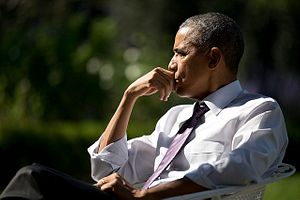On the heels of releasing a new national security strategy and budgets for the Departments of State and Defense last week, U.S. President Barack Obama spoke with Vox’s Matt Yglesias in an interview released Monday about all things foreign policy.
Obama has often been maligned for a perceived lack of a clear international agenda. Neither the strategy nor the fresh budgets for diplomacy and defense have improved the President’s standing with his detractors. “I doubt ISIL, the Iranian mullahs, or Vladimir Putin will be intimidated by President Obama’s strategy of ‘Strategic Patience,’” Senator Lindsey Graham, a Republican from South Carolina, tweeted after the strategy surfaced, referencing an early passage. But on a whole, the documents may offer something else: the contours of a long-awaited “Obama Doctrine.”
It’s not a doctrine that fits into a single sentence. True to his time in the academy, the President rarely speaks in absolutes about America’s business abroad. “I think it’s realistic for us to want to use diplomacy for setting up a rules-based system wherever we can, understanding that it’s not always going to work,” Obama told Yglesias, pausing to add a caveat. “If we have arms treaties in place, it doesn’t mean that you don’t have a stray like North Korea that may try to do it’s own thing. But you’ve reduced the number of problems that you have and the security and defensive challenges that you face if you can create those norms.”
Obama resisted realist and idealist labels. But Yglesias, a liberal journalist formerly of Slate and The Atlantic, need only read last week’s strategy to figure out where he stands. It emphasizes rules, norms, and order in the international system. “We have an opportunity – and obligation – to lead the way in reinforcing, shaping, and where appropriate, creating the rules, norms, and institutions that are the foundation for peace, security, prosperity, and the protection of human rights in the 21st century,” Obama wrote in the introduction to that document. National Security Adviser Susan Rice was more explicit, calling on the U.S. to “uphold the liberal international order” in a speech at the Brookings Institution on Friday.
So how does Washington go about building such a system?
The new national security strategy frames the Asia-Pacific as its testing ground. It describes the U.S. as a “Pacific power” and calls for strengthening nascent regional institutions like ASEAN, the EAS, and APEC to enforce rules and norms, build consensus on international challenges, and peacefully settle regional disputes. That will include efforts to ensure the free flow of transit and commerce in contested spaces, including a new maritime code of conduct for the disputed South China Sea. Letting China write these rules, Obama told Yglesias, would be a disaster: “Our businesses will be disadvantaged, our workers will be disadvantaged.”
Those measures are preceded by plans to bolster trade. State visits by Chinese Premier Xi Jinping and Japanese Prime Minister Shinzo Abe later this year will be the first steps, trips which Obama adviser Susan Rice announced at the unveiling of the national security strategy last week. The passage of the Trans-Pacific Partnership between the United States and 11 other countries on the Pacific rim, currently under review by Congress, along with an infusion of over a billion dollars from the State Department to support diplomacy, freedom of navigation, and “pivot”-related activities will follow. The strategy also emphasizes civil society programs like the Young Southeast Asian Leaders Initiative, which brings fellows from the region on exchanges to the United States.
Will it work? International order rarely develops outside of great power conflict: the Treaty of Westphalia, the U.N., and Concert of Europe all emerged from the ashes of war. Obama conceded in his interview on Monday (derided for its focus on explaining, not critiquing the President’s policies) that he has been distracted from long-term goals by short-term crises, such as the Arab Spring, over the past six years. New distractions, from ISIS to the struggle for Ukraine, won’t go away anytime soon. Washington has retreated from the world stage after Iraq and Afghanistan: cuts to the U.S. Army will soon shrink its force to under 500,000 active-duty troops. If sequestration proceeds as planned, the Army could be left with its smallest fighting force since World War II. Intervention is probably off the table as a foreign policy tool too, unless American interests or lives are directly threatened.
Obama is right to point out the caveats. Even the most successful strategies must assume a fixed outlook. A concept published in February can never account for what’s going to happen in October. Change and the inertia that it yields are the only constants in foreign policy. Over the next two years, Obama will define his legacy by where his strategy succeeds, especially in the margins left blank.

































